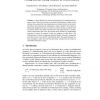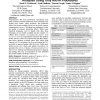182 search results - page 7 / 37 » The Secret Art of Computer Programming |
173
Voted
AAMAS
2005
Springer
15 years 2 months ago
2005
Springer
Cooperative multi-agent systems are ones in which several agents attempt, through their interaction, to jointly solve tasks or to maximize utility. Due to the interactions among t...
142
click to vote
COCO
1993
Springer
15 years 6 months ago
1993
Springer
We introduce a linear algebraic model of computation, the Span Program, and prove several upper and lower bounds on it. These results yield the following applications in complexit...
118
click to vote
ASIAN
2006
Springer
15 years 6 months ago
2006
Springer
Abstract. A major difficulty for tracking information flow in multithreaded programs is due to the internal timing covert channel. Information is leaked via this channel when secre...
117
Voted
CHI
2011
ACM
14 years 6 months ago
2011
ACM
Nonparametric data from multi-factor experiments arise often in human-computer interaction (HCI). Examples may include error counts, Likert responses, and preference tallies. But ...
127
click to vote
ESORICS
2010
Springer
15 years 2 months ago
2010
Springer
Collaborative optimization problems can often be modeled as a linear program whose objective function and constraints combine data from several parties. However, important applicat...


